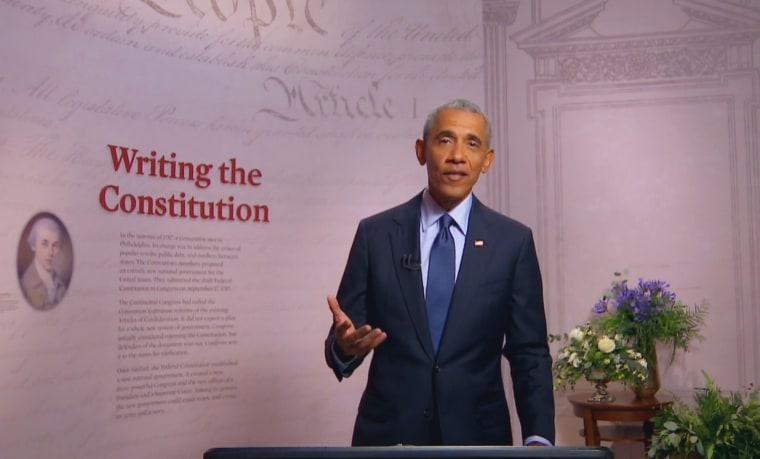The idea that former presidents refrain from criticizing their successors after leaving office is popular, but it's largely a myth. Teddy Roosevelt was scathing in his criticisms of William Taft. Herbert Hoover blasted Franklin Roosevelt. Dwight Eisenhower had plenty of unkind words about John F. Kennedy.
But I was glad to see NBC News presidential historian Michael Beschloss observe last night what I was thinking: "No former President has ever attacked his incumbent successor at a convention like Barack Obama tonight, or even come close."
It's one thing for a former president to criticize a successor's vision or agenda; it's something else when a former president makes a compelling case that his successor is putting the nation's future in severe jeopardy.
"For close to four years now, he's shown no interest in putting in the work; no interest in finding common ground; no interest in using the awesome power of his office to help anyone but himself and his friends; no interest in treating the presidency as anything but one more reality show that he can use to get the attention he craves. Donald Trump hasn't grown into the job because he can't. And the consequences of that failure are severe: 170,000 Americans dead, millions of jobs gone while those at the top take in more than ever. Our worst impulses unleashed, our proud reputation around the world badly diminished and our democratic institutions threatened like never before."
To be sure, much of Obama's message emphasized his hopes and inspirations -- the man is who he is -- but there was an element of fear undergirding the former president's prepared remarks.
Obama described an incumbent president as a corrupt narcissist, threatening the pillars that hold our country up. "This administration has shown it will tear our democracy down if that's what it takes to win," the Democrat said toward the end of his remarks.
That's a rather extraordinary 17-word sentence. The assessment is rooted in truth, of course, and that's what matters most, but no modern voter has heard a former president explain with such candor how dangerous his successor is. Obama added:
"[H]ere's the point: this president and those in power -- those who benefit from keeping things the way they are -- they are counting on your cynicism. They know they can't win you over with their policies. So they're hoping to make it as hard as possible for you to vote, and to convince you that your vote doesn't matter. That's how they win. That's how they get to keep making decisions that affect your life, and the lives of the people you love. That's how the economy will keep getting skewed to the wealthy and well-connected, how our health systems will let more people fall through the cracks. That's how a democracy withers, until it's no democracy at all. We can't let that happen. Do not let them take away your power. Don't let them take away your democracy."
Obama doesn't see Trump as a Republican opponent; he sees him as an American menace. Obama doesn't think Trump puts individual policies or priorities in jeopardy; he thinks his successor puts everything in jeopardy.
About halfway through the speech, the former president explained that Joe Biden and Kamala Harris "understand that political opponents aren't 'un-American' just because they disagree with you; that a free press isn't the 'enemy' but the way we hold officials accountable; that our ability to work together to solve big problems like a pandemic depends on a fidelity to facts and science and logic and not just making stuff up."
And it was at roughly this same point that Donald Trump made stuff up, publishing his latest unhinged tweet: "HE SPIED ON MY CAMPAIGN, AND GOT CAUGHT!"
In reality, no such thing happened. It's not altogether clear whether the Republican even believes his own nonsense.
Trump added minutes later, in reference to his predecessor, "WHY DID HE REFUSE TO ENDORSE SLOW JOE UNTIL IT WAS ALL OVER, AND EVEN THEN WAS VERY LATE?"
The answer, of course, is that Obama gave his word not to interfere in the Democratic presidential primaries -- and unlike Trump, when Obama makes a commitment like this, he honors it.
Stepping back, the contrast helped reinforce a larger point. As a former president stood in Philadelphia -- at the Museum of the American Revolution, in a gallery focused on the writing of the U.S. Constitution -- pleading with the electorate to do the right thing, the current president sat in the White House, peddling all-caps garbage on Twitter.
Obama began his remarks by saying he wanted to talk plainly "about the stakes in this election." By any reasonable measure, he succeeded in doing exactly that.

